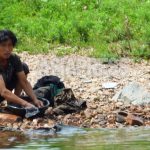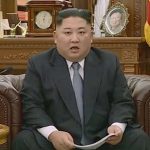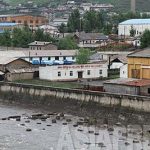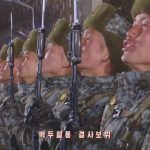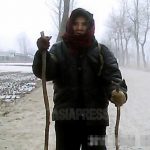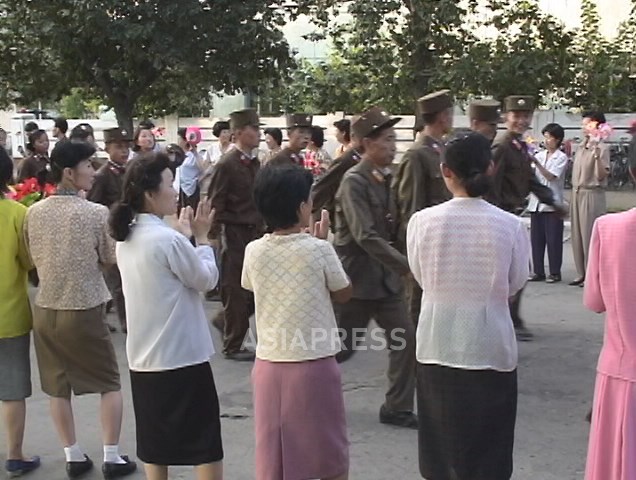
In North Korea, the military enlistment process is referred to as “chomo.” The process was originally aimed at recruiting new soldiers, but because North Korea requires young men to join the military, “chomo” actually refers to the military conscription process. Each year, the government decides the number of years new recruits must serve. This year, men are required to serve eight years, while women – who can volunteer for military service – serve just five years (these figures are based on the results of an ASIAPRESS investigation). Most students who do not head to institutes of higher education after high school enter the military, and this year there have been so many people trying to avoid military service that the authorities are working hard to pressure them to join up, even threating them with punishment. The reason so many people are trying to avoid serving in the military is because the advantages of serving have become unclear, and because the government has spent too much effort in spreading propaganda that North Korea is a “powerful country with nuclear weapons.” (KANG Ji-won / ISHIMARU Jiro)
◆ Poverty-stricken parents can’t say goodbye to their children in person
Enlistment-related events are held several times each year from the end of March to early April. New recruits wearing brand-new uniforms are gathered to march down streets to their assigned bases. The events mark the moment when sons and daughters leave their parents, who are sad about sending their children off to the military. These events are held annually in the spring.
This year, however, there have been changes because of poverty and the intense level of social controls in place.
Starting last year, the Kim Jong-un regime began encouraging high schoolers to head to higher education institutes. In short, the government told high schoolers that their military service can be postponed if they continue their education at university or professional schools. Around 20-30% of high schoolers head to university (and some students head to university or professional schools after being discharged from military service).
An ASIAPRESS reporting partner in Yanggang Province reported in late March that “families who have some wealth to spare send their kids to higher education to ensure they don’t go to the military. Poor families, however, can’t feed themselves properly, so they believe that sending their kids to the military means they’ll be able to get food on the table.”
Presently, three years after the start of the COVID-19 pandemic, the country’s economic troubles are forcing people to lead difficult lives. There are even people dying due to malnutrition and disease among the vulnerable classes of the country.
“Parents had to gather money in whatever way they could to rent out rooms because the kids coming from Un-heung to Hyesan for the enlistment-related event had no money, and thus no way to pay for a place to sleep. The neighborhood watch unit in the area, however, reported this situation to the police, which led the parents to protest in tears. Some of the parents from rural farming areas were unable to participate in the enlistment-related event, so they sent 10 kilograms of corn with their kids. They wanted to participate but had no money to do so.”
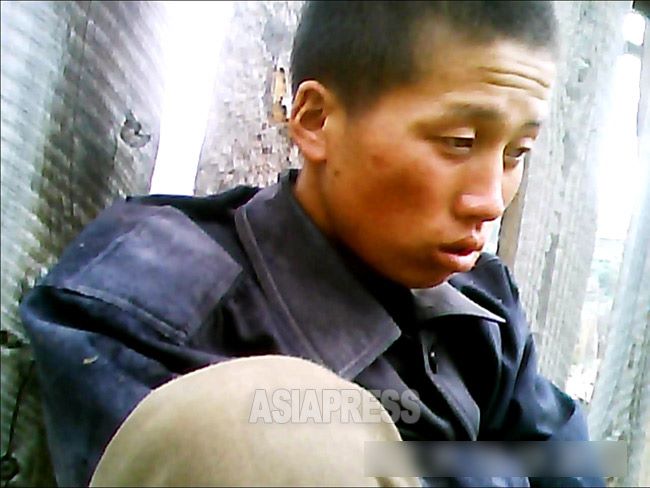
◆ Harsh crackdowns on people trying to avoid service
ASIAPRESS reporting partners said that many young people are trying to avoid military service this year. One reporting partner in Yanggang Province said:
“The government plans to strongly crackdown on people who try to avoid military service under the pretexts of family poverty or disease. A meeting was held by the Workers’ Party committee at a paper factory to discuss ways to prevent young employees from avoiding military service. The committee concluded that it would send those who avoided military service to farming areas or work brigades, and that parents of the kids would also be punished.
“One student in Wuiyong-dong didn’t want to go to the military so he postponed his entry into service by saying he had a disease while refusing to undergo a physical examination. The party organization considered this an act of avoiding military service and expelled his parents from the party.”
One of the reasons why young people are less interested in joining the military than in the past is because there is less incentive to become a soldier. Two years ago, the Kim Jong-un regime reduced the military service period for men from 13 years to just eight years, but it also took away the priority status given to discharged soldiers to become party members. Instead, whether or not discharged soldiers can be party members depends on what they do in their post-military lives. Becoming a party member is necessary if one wants to achieve success in North Korean society.
In fact, the regime is increasingly sending discharged soldiers to rural farming areas and coal mines or labor brigades, all types of work nobody wants to do. There has been a rise in the number of parents who think their children don’t need to join the military. The authorities are working hard to change how people think on the matter, however.
The reporting partner told ASIAPRESS that “one parent whose son was sickly since he was a child went to the military mobilization department multiple times to express concern that the military would cause him great harm, but the officials there said that those already registered could not be taken off the recruitment list.”
※ Military mobilization departments are under the National Reserve Forces Division and handle recruitment-related matters.
◆ Admit to your mistakes
Starting in late March, the military mobilization departments held seminars for new military recruits. The son of a relative of one of the reporting partners will be joining the military this year, so he was able to hear what was said at the seminar:
“They talked about the importance of military service, along with cases where people failed to complete their proper military service because they ran off from their bases or were discharged (for malnutrition or other reasons), contrasting these cases with those who did so well in their military service that they became cadres. They also emphasized that recruits must do a good job in their military service given they are soldiers of a powerful country with nuclear weapons. They also demanded that students who had lived impure lives up until that point come clean and admit to their mistakes.”
There are many young people in North Korea who have consumed content such as South Korean dramas and K-pop music videos, which are considered impure by the authorities. At the seminars, officials appear to have demanded that those who consumed such foreign content admit their mistakes before joining the military, the goal being that these new recruits do not continue these activities while serving.
◆ Nobody believes war will break out
Meanwhile, many young people believe that military service is unimaginably boring, one of the reporting partners told ASIAPRESS.
“The government has told us numerous times that nobody can attack us because we have nuclear weapons, so young people say confidently and out loud that they believe war will not break out and, even if it does, they won’t be the ones fighting.”
The Kim Jong-un regime has spread so much propaganda that the country is a “powerful country with nuclear weapons” that many young people believe that no war will break out and that just getting through military service without overachieving is all they need to do.
※ ASIAPRESS communicates with its reporting partners through Chinese cell phones smuggled into North Korea.
- <Interview with Two N. Korean> The 1.4 million young people petitioning for the military was just for show…they know they won’t have to join up to fight against the Americans and South Koreans
- <Inside N. Korea> Laborers forced to begin group commutes to work while singing in what appears to be the regime’s efforts to strengthen control over the people
- <Inside N. Korea>Suddenly pulls out “Storm Corps” from the border region, perhaps as a response to US-ROK drills
- <Inside N. Korea>Food sales banned in markets, leading to anxiety and concern while deepening the poverty suffered by the poor
- <Inside N. Korea>Poverty-stricken urban dwellers raid farming villages in search of food…the police are on emergency alert to deal with the rise in robberies
